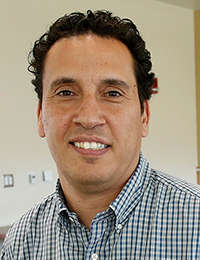The Best Cyber Offense is a Good Cyber Defense Texas Cyber NSA-accredited Schools
As hostile actors target our national security, economy and infrastructure through cyberthreats, Texas colleges and universities have risen to the challenge to protect our nation. Eighteen Texas state colleges and universities have partnered with the National Security Agency (NSA) to become national centers for academic excellence in cyber defense education, charged with creating the next generation of skilled cybersecurity experts.

Dr. Kamil Sarac leads his students through a hands-on learning project as part of the curriculum offered by the Cyber Security Research and Education Institute at The University of Texas at Dallas.
To receive this prestigious designation, candidate schools must meet NSA standards and criteria for their academic programs, institutional resource commitments, faculty qualifications and their own cybersecurity practices.
“The academic institutions in the Centers for Academic Excellence in Cyber Defense program are all leaders in the field of cybersecurity and are all invested in outreach to their communities and to primary and secondary education, collaboration with state and federal education leaders, and development of cybersecurity as a profession,” says an NSA spokesperson.
Texas ranks among the top five states in the number of NSA-designated national centers for cybersecurity education, according to Cyberseek.org, a project supported by the National Initiative for Cybersecurity Education (NICE), a program of the U.S. Department of Commerce. Students graduating from NSA-designated Texas programs are well-positioned to find employment with the U.S. Department of Defense and other federal agencies as well as private industry.
Texas’ 18 NSA-designated national centers are as diverse as the Lone Star State itself, offering programs emphasizing different facets of cybersecurity.

Dr. Salamah Salamah
The University of Texas at El Paso
The University of Texas at El Paso (UTEP) focuses on cyber defense programs and collaborates with military research projects. “Over the past couple of years, the Computer Science (CS) Department at UTEP has developed highly competitive programs in the area of cybersecurity,” says Dr. Salamah Salamah, a UTEP associate professor in computer science.
“This includes concentrations in cybersecurity within the bachelor of science in computer science (BSCS) program and the software engineering master’s program,” Salamah says. “Through the BSCS program, UTEP has been designated by NSA as a Center of Academic Excellence (CAE) in both cyber defense and cyber operations, and is one of only 20 universities to hold both designations nationwide. And through the CS department’s collaboration with the Army Research Lab (ARL) in the area of cybersecurity, UTEP was designated as an ARL-South campus in August 2017.”
The Center for Cyber Analysis and Assessment allows ARL and UTEP personnel to collaborate, using Army facilities to test prototypes and conduct cybersecurity research.

Dr. Kamil Sarac
The University of Texas at Dallas
The University of Texas at Dallas “has a large group of research-active faculty conducting cutting-edge research covering most areas of cyber security,” says Dr. Kamil Sarac, an associate professor and director of education programs for the Cyber Security Research and Education Institute.
“Our students are direct beneficiaries of these efforts, as we actively involve them in research and convey the results of that work in our classroom teaching,” he says. “Since 2011, more than 50 domestic students who graduated with M.S. or Ph.D. degrees from our cybersecurity programs joined various government agencies to pursue research and development-focused positions to actively serve the mission of securing the cyberspace of our country.”
While other Texas colleges and universities focus on protecting U.S. military and government agency cyber assets, the program at Texas A&M University-San Antonio (TAMU-SA) concentrates on protecting the country’s businesses, communities and economic security.

Dr. Akhtar Lodgher
Texas A&M University-San Antonio
“It’s rare for a university’s cybersecurity program to be located in its business school,” says Dr. Akhtar Lodgher, chair of the Department of Computing and Cyber Security and director of the Center for Information Technology and Cyber Security at TAMU-SA. “But we know that cybersecurity, in and of itself, does not deliver optimum value unless it’s woven into the fabric of a business.
“That’s why we infuse cyber security into everything we teach,” Lodgher says. “Our unique model empowers students to leverage cybersecurity as a competitive advantage instead of just an ‘add-on’ IT function. Earning the NSA cybersecurity certificate through one of our programs makes our students more competitive when they enter the job market and more marketable to private-sector industries that want to protect their companies from cyberattacks.” FN

